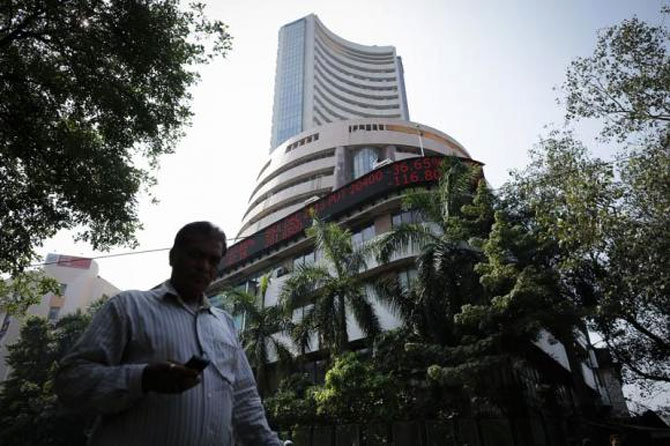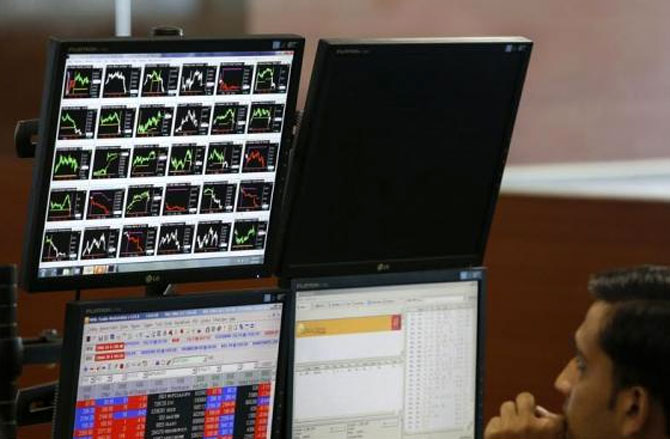Photographs: Arko Dutta/Reuters Puneet Wadhwa in New Delhi
Give some thought to stocks you pick and your appetite for risk as observers are unsure if the market will go up or down
Will the markets hit an upper circuit filter on May 16, the day Lok Sabha results are declared? Not necesssarily, say analysts. In fact, the reverse could also happen, of hitting the lower circuit, in case the poll outcome is not considered a favourable one.
Circuit filters or breakers are meant to keep the fluctuation in a stock’s value within certain limits on any day. If it hits the limit, either way, trading has to stop in that particular stock.
Click on NEXT for more...
Which way will the market swing on May 16?
Image: Market participants are hoping for a clear mandate for a Narendra Modi-led pro-reform and business-friendly government.Photographs: Reuters
As the elections head into the final laps, all eyes are set on the outcome, on May 16, with market participants hoping for a clear mandate for a Narendra Modi–led pro-reform and business-friendly government.
However, over the past few sessions, the markets have been range-bound, as investors fine-tune their strategy to maximise gains on May 16.
To cope with volatility, market participants have requested the regulator, the Securities and Exchange Board of India, to increase the trading time on May 16 and also allow a special session the following day.
So, will the markets hit the upper circuit filter as soon as they open for trade in case of a favourable poll outcome or will they tank in case of a fractured mandate?
Click on NEXT for more...
Which way will the market swing on May 16?
Image: The exchanges compute the Index circuit breaker limits on a daily basis.Photographs: Danish Siddiqui/Reuters
Hitting the circuit
Stock exchanges implemented index-based market-wide circuit breakers with effect from July 2, 2001. Some modifications were made in September 2013.
The system applies at three stages of the index movement, either way, at 10 per cent, 15 per cent and 20 per cent. These breakers, when triggered, bring about a coordinated trading halt in all equity and equity derivative markets, pan–India.
The market-wide breakers are triggered by a movement of either the BSE Sensex or the NSE CNX Nifty, whichever is breached earlier. The exchanges compute the Index circuit breaker limits on a daily basis, based on the previous day’s closing level of the index.
Andrew Holland, chief executive officer, Ambit Investment Advisors, says, “The markets will give a thumbs-up to the outcome if the National Democratic Alliance (NDA) gets 250–260 or above seats. The previous election outcome was over the weekend and that’s why one saw a gap-up opening when the markets opened for trade. Moreover, we’ll get the exit polls on May 12 and the markets might start factoring in the actual outcome around that time. So, by May 16, most of it could already be priced in and the markets might not hit the upper circuit filter that day.”
Click on NEXT for more...
Which way will the market swing on May 16?
Image: Unlike in the past, expectations are fairly built-in as regards Modi forming the government.Photographs: Vivek Prakash/Reuters
“Three hundred seats to the NDA and/or over 260 seats to the Bharatiya Janata Party will translate into a euphoric market sentiment. Expectations would increase manifold in case the actual numbers exceed projections.
However, investors have matured overtime and are not driven by sentiments beyond a point. Unlike in the past, expectations are fairly built-in as regards Modi forming the government. Thus, I don’t expect the markets hitting a circuit this time,” says Deven Choksey, managing director and chief executive officer, K R Choksey Shares and Securities.
Sunil Jain, vice-president, equity research, at Nirmal Bang, also feels the chances of markets hitting an upper circuit on May 16 are less, even with a favourable outcome.
“On the other hand, if the outcome is totally negative, the markets can hit the lower circuit, since the recent up-move was more of a ‘hope rally’. If there is a clear mandate for the NDA, then the Nifty can hit 7,200–7,300 on May 16. This is assuming the exit polls on May 12 are as per expectation and the Nifty rallies close to 6,700–6,800 levels,” he says.
Click on NEXT for more...
Which way will the market swing on May 16?
Photographs: Arko Dutta/Reuters
Trading strategy
So, how should you play the markets on May 16 and which stocks should you buy?
Gaurav Dua, head of research at Sharekhan, expects a rise in the volatility index (INDIA VIX) and suggests that for negotiating this and the swings in stock prices, it is best to participate in indices and stock trades via the options route.
“Crompton Greaves, Reliance Industries (RIL) , Mahindra & Mahindra, Reliance Infra, Adani Enterprises, ICICI Bank, BHEL, Larsen & Toubro, the Nifty and Bank Nifty are some of the stocks and indices that can see a positive momentum from the current levels. Hence, to capitalise the momentum, we can look to set an option strategy, as most of the stocks are trading at a life-time high and about to break-out on the higher side,” he says.
Adds Jain of Nirmal Bang: “The trading strategy will depend on the risk profile of an individual. We feel there are strong chances of the markets continuing the up-move post the election outcome. There is enough scope for banking stocks to move up and we recommend ICICI Bank and YES Bank from this space.”
Choksey likes Oil and Natural Gas Corporation, Coal India, RIL, Tata Motors, Bajaj Auto, Sesa Sterlite, Jain Irrigation, Sterlite Technology and Adani Port. He suggests buying these on a decline, to maximise gains.







article